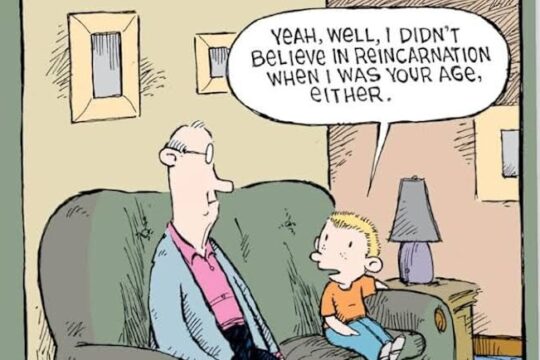Reb irth, or reincarnation, was assumed by most premodern Buddhists – and is believed by many modern Buddhists – to be “the way things are” for sentient beings in the cosmos: we have lived before, and likely we will live again. In this third of three talks, I analyze the place of rebirth within modern (post-1800) Buddhism, tracing the history of the reception of the idea in the West and describing it in terms of four possible stances: literalism, neo-traditionalism, modernism, and secularism. I will trace several recent debates about the topic, weighing the evidence and arguments adduced by the participants. In conclusion, I will tentatively suggest a way forward in thinking about rebirth in a “disenchanted,” scientific age.
irth, or reincarnation, was assumed by most premodern Buddhists – and is believed by many modern Buddhists – to be “the way things are” for sentient beings in the cosmos: we have lived before, and likely we will live again. In this third of three talks, I analyze the place of rebirth within modern (post-1800) Buddhism, tracing the history of the reception of the idea in the West and describing it in terms of four possible stances: literalism, neo-traditionalism, modernism, and secularism. I will trace several recent debates about the topic, weighing the evidence and arguments adduced by the participants. In conclusion, I will tentatively suggest a way forward in thinking about rebirth in a “disenchanted,” scientific age.
Listen to the recording of previous lectures in this series
Buddhist Rebirth: Contexts, Structures, and Functions
May 19, 2024: In this first of two talks, Professor Jackson will examine the Buddhist idea of rebirth in the context of world and Asian cultures; analyze the historical Buddha’s attitude toward rebirth; and describe the overall Buddhist notion of the realms of rebirth, the causes and conditions of rebirth, and the relation between karma and rebirth, noting differences among the three yānas and some variations in particular Asian cultures.
Rebirth: Rhetoric, Reality, and Argument in Indian Buddhist Texts
January 11, 2025: In this second of three talks, Professor Jackson will briefly review the basic Indian ideas about rebirth covered in the first lecture, then focus on the rhetoric and reality of discourse about rebirth in Indian Mahāyāna and Vajrayāna Buddhist texts; detail traditional Indian arguments in favor of rebirth; and consider the “paradox” of rebirth vis à vis the classic Buddhist doctrine of no-self.
